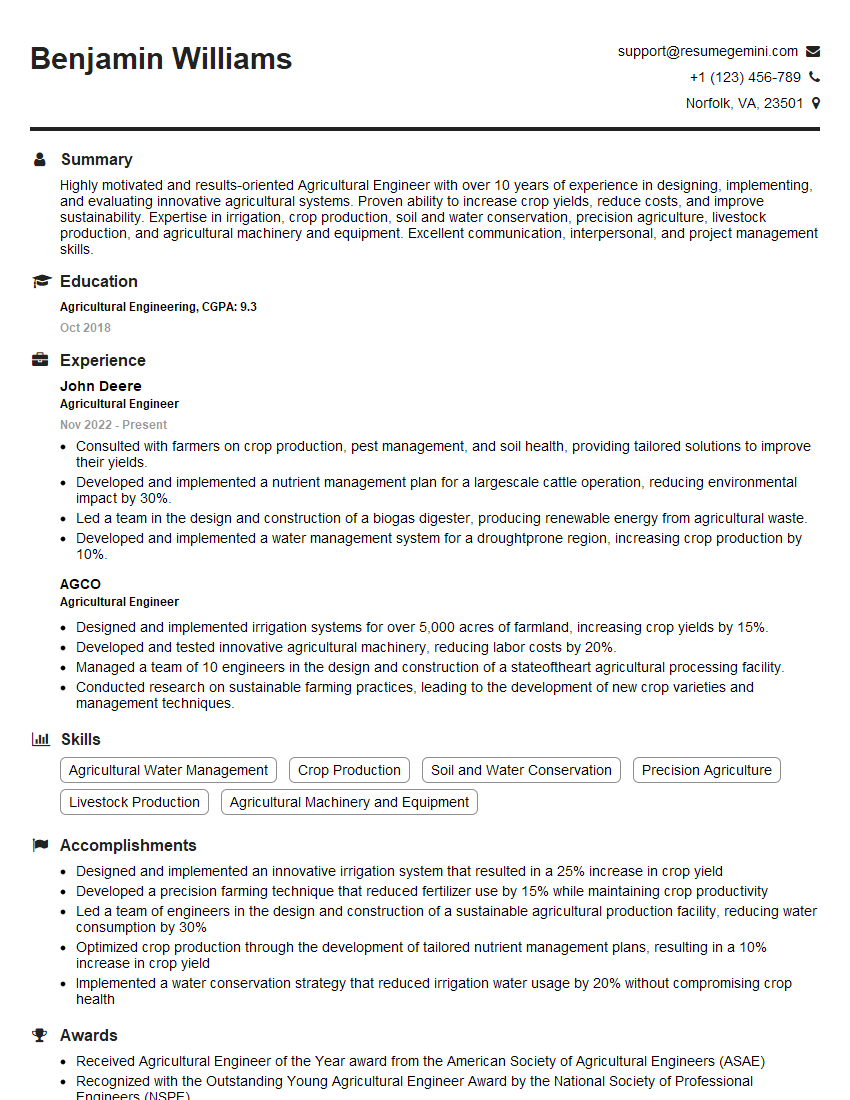Are you a seasoned Agricultural Engineer seeking a new career path? Discover our professionally built Agricultural Engineer Resume Template. This time-saving tool provides a solid foundation for your job search. Simply click “Edit Resume” to customize it with your unique experiences and achievements. Customize fonts and colors to match your personal style and increase your chances of landing your dream job. Explore more Resume Templates for additional options.

Benjamin Williams
Agricultural Engineer
Summary
Highly motivated and results-oriented Agricultural Engineer with over 10 years of experience in designing, implementing, and evaluating innovative agricultural systems. Proven ability to increase crop yields, reduce costs, and improve sustainability. Expertise in irrigation, crop production, soil and water conservation, precision agriculture, livestock production, and agricultural machinery and equipment. Excellent communication, interpersonal, and project management skills.
Education
Agricultural Engineering
October 2018
Skills
- Agricultural Water Management
- Crop Production
- Soil and Water Conservation
- Precision Agriculture
- Livestock Production
- Agricultural Machinery and Equipment
Work Experience
Agricultural Engineer
- Consulted with farmers on crop production, pest management, and soil health, providing tailored solutions to improve their yields.
- Developed and implemented a nutrient management plan for a largescale cattle operation, reducing environmental impact by 30%.
- Led a team in the design and construction of a biogas digester, producing renewable energy from agricultural waste.
- Developed and implemented a water management system for a droughtprone region, increasing crop production by 10%.
Agricultural Engineer
- Designed and implemented irrigation systems for over 5,000 acres of farmland, increasing crop yields by 15%.
- Developed and tested innovative agricultural machinery, reducing labor costs by 20%.
- Managed a team of 10 engineers in the design and construction of a stateoftheart agricultural processing facility.
- Conducted research on sustainable farming practices, leading to the development of new crop varieties and management techniques.
Accomplishments
- Designed and implemented an innovative irrigation system that resulted in a 25% increase in crop yield
- Developed a precision farming technique that reduced fertilizer use by 15% while maintaining crop productivity
- Led a team of engineers in the design and construction of a sustainable agricultural production facility, reducing water consumption by 30%
- Optimized crop production through the development of tailored nutrient management plans, resulting in a 10% increase in crop yield
- Implemented a water conservation strategy that reduced irrigation water usage by 20% without compromising crop health
Awards
- Received Agricultural Engineer of the Year award from the American Society of Agricultural Engineers (ASAE)
- Recognized with the Outstanding Young Agricultural Engineer Award by the National Society of Professional Engineers (NSPE)
- Honored with the Excellence in Agricultural Research award from the United States Department of Agriculture (USDA)
- Received a patent for an innovative agricultural machinery design that improved operational efficiency
Certificates
- Certified Professional Agricultural Engineer (CPAgE)
- Certified Irrigation Designer (CID)
- Certified Soil Scientist (CSS)
- Certified Crop Adviser (CCA)
Career Expert Tips:
- Select the ideal resume template to showcase your professional experience effectively.
- Master the art of resume writing to highlight your unique qualifications and achievements.
- Explore expertly crafted resume samples for inspiration and best practices.
- Build your best resume for free this new year with ResumeGemini. Enjoy exclusive discounts on ATS optimized resume templates.
How To Write Resume For Agricultural Engineer
- Quantify your accomplishments with specific metrics to demonstrate the impact of your work.
- Highlight your expertise in specialized areas such as precision agriculture or sustainable farming practices.
- Include relevant certifications or professional memberships to enhance your credibility.
- Tailor your resume to each job you apply for, emphasizing the skills and experience that align with the specific requirements.
- Proofread your resume carefully for any errors before submitting it.
Essential Experience Highlights for a Strong Agricultural Engineer Resume
- Designed and implemented irrigation systems for over 5,000 acres of farmland, increasing crop yields by 15%.
- Developed and tested innovative agricultural machinery, reducing labor costs by 20%.
- Managed a team of 10 engineers in the design and construction of a state-of-the-art agricultural processing facility.
- Conducted research on sustainable farming practices, leading to the development of new crop varieties and management techniques.
- Consulted with farmers on crop production, pest management, and soil health, providing tailored solutions to improve their yields.
- Developed and implemented a nutrient management plan for a large-scale cattle operation, reducing environmental impact by 30%.
- Led a team in the design and construction of a biogas digester, producing renewable energy from agricultural waste.
Frequently Asked Questions (FAQ’s) For Agricultural Engineer
What is the role of an Agricultural Engineer?
Agricultural engineers design, develop, and implement systems and equipment to improve agricultural production and efficiency. They work on a wide range of projects, including irrigation systems, crop production, soil and water conservation, precision agriculture, livestock production, and agricultural machinery and equipment.
What are the educational requirements for becoming an Agricultural Engineer?
A bachelor’s degree in Agricultural Engineering or a related field is typically required to become an Agricultural Engineer. Some states may also require licensure.
What are the career prospects for Agricultural Engineers?
Agricultural Engineers are in high demand due to the growing need for food production and sustainability. They can work in a variety of settings, including government agencies, private companies, and universities.
What skills are important for Agricultural Engineers?
Important skills for Agricultural Engineers include problem-solving, analytical thinking, communication, and teamwork. They should also have a strong understanding of mathematics, science, and engineering principles.
What are the challenges facing Agricultural Engineers?
Agricultural Engineers face a number of challenges, including climate change, water scarcity, and food security. They must develop innovative solutions to meet these challenges and ensure the sustainability of the agricultural industry.